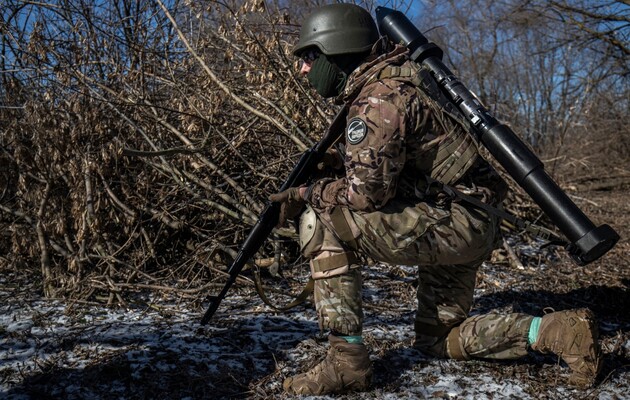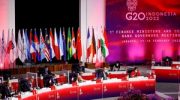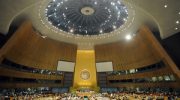The Ukrainian army has shown that, with the right support, it can dispel Moscow's imperialist myths by providing stable security for the entire continent.

When Vladimir Putin ordered Russian troops to invade Ukraine, he was not the only one who thought victory would be imminent. Many analysts in the West expected Kiev to fall in 72 hours . Ukrainian valor and ingenuity destroyed these calculations. The war has been going on for six weeks. And the winning side is Ukraine, not Russia.
The Economist writes about this, adding that the Ukrainian victory “will rewrite the map of European security.” Speaking to reporters on March 25 in Kyiv, President Volodymyr Zelensky explained that the people's strength is the secret of the Ukrainian resistance and the reason why the war is changing in favor of the Ukrainian side.
“We believe in victory. Here is our home, our land, our independence. It's only a matter of time, “he said.
The battlefield confirms the words of the Ukrainian president. After several weeks of halting the Russian offensive, the Ukrainian army launched a counteroffensive. On March 29, Russia announced that it would radically reduce its campaign in the north. This retreat can be tactical. But in any case, Russia has in fact acknowledged that it cannot capture Kyiv now. At the same time, an impressive part of Ukraine remains in Russian hands, in particular, the strip of land along the coast in the south. Moscow now claims that its goal was to seize these territories from the very beginning. A significant part of the Ukrainian army in Donbass risks being surrounded. No one should underestimate Russia's firepower.
Read also: Politico: Restoring Ukraine will be expensive, how to make Putin pay?
Despite the fact that Moscow's troops are exhausted and demoralized, they may dig in. For Ukraine, the victory will be to preserve the inviolability of its brigades in the Donbass, which could be used to prevent Russia from retaining the occupied territories. To do this, Zelensky said, the West must impose tougher sanctions on Russia and hand over even more weapons, including planes and tanks. Sanctions deprive Moscow of the opportunity to support a long war. Weapons are helping Ukraine regain territory. But NATO countries refuse to give Kiev what it asks for.
Given that it is at stake for both the West and Ukraine, such stubbornness exposes the lack of a strategic vision. In the Ukrainian case, a clear victory will mean that there will be no new invasion in the future. The more convincingly the Ukrainian army will displace the Russian, the more Kyiv will be able to resist compromises that will poison the world. Victory will also be a good basis for the development of a post-war democracy that will not be corrupted by oligarchs and Russian influence.
Read also: Russian tankers deliberately disappear from the radar to circumvent sanctions – CNN
For the West, victory will also be no less rewarding. Ukraine could not only breathe life into democracy, but also strengthen security in Europe. During the 300 years of imperialism, Russia has repeatedly waged wars against Europe. Sometimes, as in the case of the conflicts with Poland and Finland, she was an invader. Sometimes, as in the days of Napoleonic France and Nazi Germany, she was a victim of aggression. A strong, democratic Ukraine will suppress Russian expansionism. Because its borders will be protected. In the short term, the evil and losing dictator will continue to sit in the Kremlin. But in the end, Russia will follow in Ukraine's footsteps and begin to solve its own problems through reforms, not through military adventures abroad. In this case, NATO will not have to lose too large budgets and diplomatic resources. The United States will be able to focus on its confrontation with China.
But so far the West does not want to notice this historic opportunity. America is playing its part as a leader, as it should be, although it has vetoed sending planes across Ukraine. But Germany has a short-sighted stance on sanctions, balancing pressure from allies with public opinion aimed at maintaining trade ties with Russia, which largely meets oil and gas needs. French President Emmanuel Macron, for his part, has argued that sending the heavy weapons Ukraine needs will turn the Western allies into “accomplices.” Zelensky says that such a position is either short-sighted or cowardly. The Economist agrees with the Ukrainian president.
Read also: NYT: Putin miscalculated in Ukraine, but is it so?
Perhaps Germany doubts that Ukraine will be able to get rid of its post-Soviet past. The protests on the Maidan in 2014 established democracy. But the country still failed to cleanse itself of corruption and inertia. And after the shelling by Russian artillery, the Ukrainian economy will be in ruins. However, the EU can help make sure that this time everything is different by starting work on Ukrainian membership right now. There is hardly a better way to confirm that, since its inception, the EU's goal has been to establish peace on a continent that has been torn apart by wars for centuries. Bringing Ukraine to the EU in line with the EU will be a long and bureaucratic process. The risk is that Brussels will take on the Ukrainian process if Europe allows Kiev to join. Instead, the EU must embrace Ukraine vigorously, as it did with Eastern Europe after the fall of Soviet domination in the early 1990s. This will require generous assistance in economic recovery, as well as political support and patience.
Macron voiced another fear: that NATO would provoke Russia. Since the beginning of the war, speaking of “consequences you have not seen in your entire history,” Putin has hinted that he may respond to Western intervention with a nuclear strike. Therefore, NATO tried to make it clear that it would not go to war with Russian troops. Because if that happened, the war could spiral out of control and lead to catastrophic consequences. But the constant retreat due to Putin's nuclear threats is also risky. Restricting aid to Ukraine will allow Russia to impose an unstable, and therefore temporary, peace on Zelensky. Putin will thus be rewarded for his threats. He will have a basis for preparing for his next nuclear aggression. At the same time, the transfer of more powerful weapons and tougher sanctions will be a change in the scale of aid, not its type. This week, because of Ukraine's success, Russia paused its campaign in the north, rather than escalating. Therefore, the best deterrent for NATO is to oppose Putin's veiled threats, letting him know that a nuclear or chemical crime will lead to Russia's complete isolation.
War is unpredictable. There are many conflicts in history that should not have lasted long, but lasted for years. Ukraine won the first stage, simply resisting. Now he needs to go on the offensive. So Zelensky needs double the help of the West. It would be awful if the lack of imagination of European capitals would prevent a good world from being established instead of a bad one.
See the special topic: Million dollars for the plane: Remuneration will be paid for the enemy equipment transferred to the APU The new law applies to both Ukrainians and the Russian military. The mayor of Melitopol released from captivity met with Macron The story of the mayor struck the French president. The Ministry of Justice told how many children were born in Ukraine since the beginning of the war So far, data from the executive committees from the temporarily occupied territories are missing. The government has launched programs for internally displaced persons to help with work, housing and payments The country's authorities are asking people to enroll in relevant programs. Danilov: There are many battles ahead, because Putin has not backed down from plans for the May 9 parade. Ukrainians should prepare for new battles against the Russian invaders.


